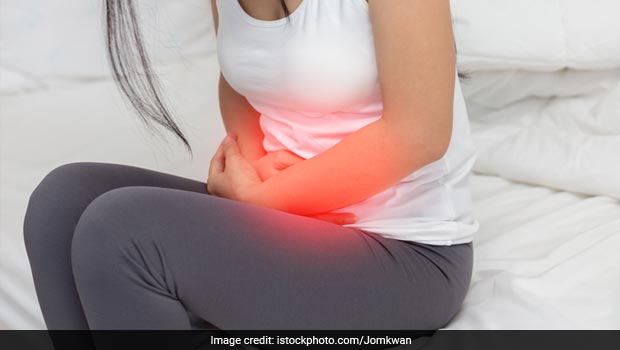Endometrial cancer affects women. It is a type of cancer which develops in the lining of the uterus. Women above the age of 40 are at a higher risk of this cancer. Read here to know everything about endometrial cancer.

Endometrial cancer leads to irregular bleeding in women initially
HIGHLIGHTS
- Endometrial cancer begins in the uterus
- Pelvic pain is one of the symptoms of endometrial cancer
- Hormonal imbalance can increase the risk of this cancer
Endometrial cancer is a type of cancer that affects the lining of the uterus. This cancer is on the rise in India now. The treatment option for endometrial cancer is usually surgery, which could involve the removal of nearby tissues along with the uterus. For this purpose, the detection of endometrial cancer at the right time is very important. The process for diagnosis of this cancer involves an ultrasound and a biopsy from the endometrium. There are four stages of this cancer. Compared to other types of cancer, the awareness of endometrial is relatively low among Indian women. Hence, they are not aware of the various treatment options too. Most Indian women do not go for a regular gynaecological check-up, and their health takes a back seat. Educating women and their families on this cancer is crucial.
All you need to know about endometrial cancer
What are the alarming symptoms and why are cases on the rise?
In the majority of the cases, symptoms of endometrial cancers are seen in the early stages. It can vary from patient to patient, depending on their age. In women at the menstruating age, irregular bleeding is an early sign of endometrial cancer. Though there can be different causes for irregular bleeding, it is important to consult a gynaecologist and ascertain the cause. Another symptom could be an increase in bleeding or bleeding between two cycles. Women ignore these symptoms by approaching the doctor only when the condition becomes unmanageable.
Menstruating women between the ages of 40 and 45 years who show such symptoms reach out to their friends and family instead of a doctor; this practice is extremely risky. Women who have attained menopause could experience bleeding - which would probably be just a drop or excessive. Changes in lifestyle; food habits, rural-urban migration are a few factors associated with this cancer. Diabetes, high blood pressure, hypertension, obesity, and nulliparity (i.e. not having any children) could be underlying causes for women having this cancer.

Women above 40 years of age are at a higher risk of endometrial cancer
Photo Credit: iStock
Who is at a risk?
Incidence of endometrial cancer is rare in women below the age of 40 years and is more common in women between the ages of 40 and 65 years. As one grows older, the chances of having endometrial cancer also increase. Over 80-85 % of women can lead a normal life when the cancer is detected at early stages.
If detected at stage 1 - more than 90% of patients survive for over 5 years. A patient is said to be in the second stage when cancer has spread to the cervix. The chances of survival reduce in this case. If the cancer is detected at stage 3, only 40 % to 60% of patients survive beyond 5 years.
Women who are obese or have diabetes have twice the chance of having endometrial cancer than other women. Once the patient has endometrial cancer, the treatment and outcome of the disease is almost the same- whether the patient is diabetic or non-diabetic.
Also read: Type 2 diabetes tied to endometrial cancer
Treatment and prevention
As a lifestyle disease, women can reduce the chances of having this disease by maintaining a healthy diet and controlling the blood sugar level. Women should be conscious of changes in their body, such as menstrual cycle or abnormal bleeding, and consult a doctor immediately. Doctors can take biopsy from the endometrium in the clinic with the help of a pipelle syringe which takes about 5 minutes. This is also performed as an outpatient procedure. If cancer is confirmed, then they need to undergo surgery, followed by radiation therapy for some patients.
Also read: Obesity increases risk of endometrial cancer
Few of these patients may have to undergo chemotherapy treatment to help reduce the chance of relapse of the cancer. Nowadays, modern technology like robotic-assisted surgeries is also opted for treatment. Robotic-assisted surgical systems perform surgeries with great precision, dexterity, small incisions, thus making the removal of the uterus, ovaries, lymph nodes seamless and benefitting the patient in quicker recovery, lesser infection, and fewer health complications and short hospital stay. Traditional surgeries are also performed for removal of the cancer. The doctor prescribes the right treatment according to the condition.
(Dr. Anupama Rajan Babu is a Robotic Surgeon and Professor & Head of Department of Gynecologic Oncology, Amrita institute of Medical Sciences, Kochi)
Disclaimer: The opinions expressed within this article are the personal opinions of the author. NDTV is not responsible for the accuracy, completeness, suitability, or validity of any information on this article. All information is provided on an as-is basis. The information, facts or opinions appearing in the article do not reflect the views of NDTV and NDTV does not assume any responsibility or liability for the same.
DoctorNDTV is the one stop site for all your health needs providing the most credible health information, health news and tips with expert advice on healthy living, diet plans, informative videos etc. You can get the most relevant and accurate info you need about health problems like diabetes, cancer, pregnancy, HIV and AIDS, weight loss and many other lifestyle diseases. We have a panel of over 350 experts who help us develop content by giving their valuable inputs and bringing to us the latest in the world of healthcare.













